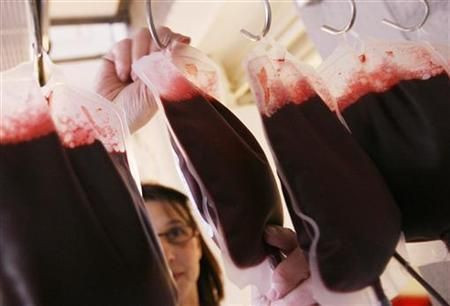FDA Ban On Male Gay Blood Donation Must End, Says Change.Org Petition

More and more activists and medical professionals are calling for an end to a Reagan-era ban on gay male blood donations, but is the U.S. Food and Drug Administration listening?
In response to the AIDS outbreak, the FDA enacted guidelines that prohibit men who have sex with other men from donating blood -- for life. The guidelines went into effect in 1983, a time when very little was known about the disease and how to detect it.
But a growing chorus of critics are calling the ban at best outdated and at worst homophobic. In June, as ABC News reported, the American Medical Association voted to oppose the ban, urging a policy based on an individual’s level of risk and not sexual orientation alone.
In countries such as the U.K. and Australia, gay men may donate blood if they have abstained from sex for at least a year. And, in May, the Canadian government lifted its 30-year-old ban, allowing gay men to donate blood if they have been abstinent for five years, as the Canadian Press reported via CTV News.
Now one openly gay California public officeholder is saying it’s time for the U.S. to move with the times. Evan Low, mayor of Campbell, Calif., launched an online petition at Change.org this month, calling on the FDA to “[s]top discriminating against me and other gay men who want to donate blood.”
According to Low’s petition: “Advances in technology and the understanding of HIV/AIDS have come a long way. The fact of the matter is that blood donations are safest and most effective when using rational, scientifically-based deferral periods that are applied fairly and consistently among blood donors who engage in similar risk activities. These screening strategies provide an inclusive, internationally recognized means for keeping blood supplies safe.”
In 2010, at the age of 26, Low became the youngest openly gay mayor in the country. He was born the same year the ban on gay blood donors was adopted. Campbell is a suburb of San Jose in Silicon Valley.
In July, Low walked into a local Red Cross blood-drive center to donate blood, but he was denied because he is openly gay, as multiple media outlets reported at the time. In his petition, Low said he is confident that the FDA ban will “one day exist as a relic of historical discrimination.”
Further fueling the controversy over the ban on gay blood donors is an emergency announcement made by the American Red Cross, which said blood donations were down about 10 percent around the country in June, compared with the same period last year.
Meanwhile, the FDA continues to stand by its policy. On its website, it says “scientific evidence has not yet demonstrated that blood donated by [men who have had sex with men] or a subgroup of these potential donors does not have a substantially increased rate of HIV infection compared to currently accepted blood donors.”
Since Low’s petition was launched, it has attracted more than 11,400 signatures. Low is seeking 15,000 before the petition is sent to the U.S. Department of Health and Human Services. A similar petition launched at WhiteHouse.gov this year failed to attract the 25,000 signatures needed to necessitate a response from the Obama administration.
Read Low’s full petition here.
© Copyright IBTimes 2024. All rights reserved.






















